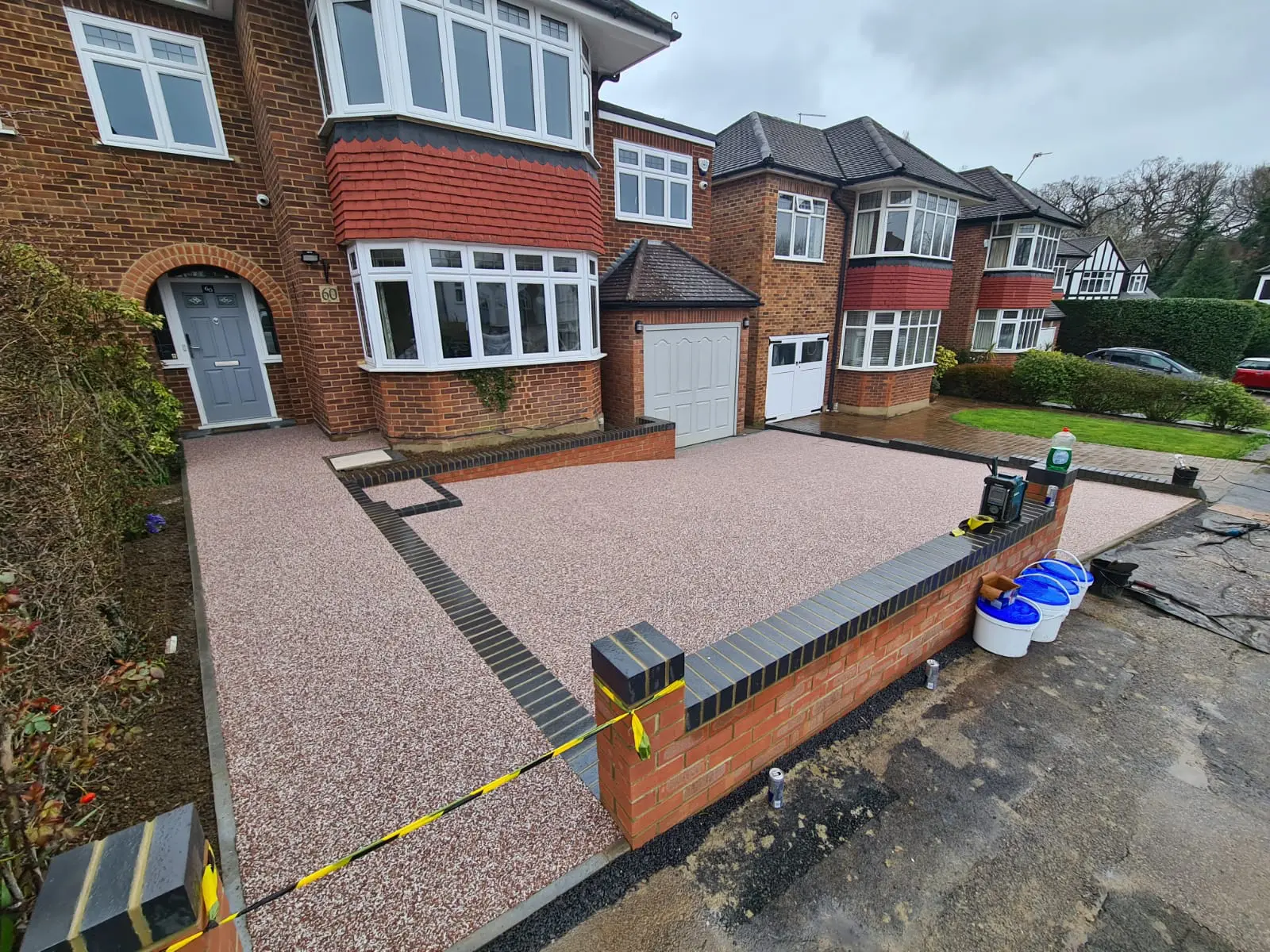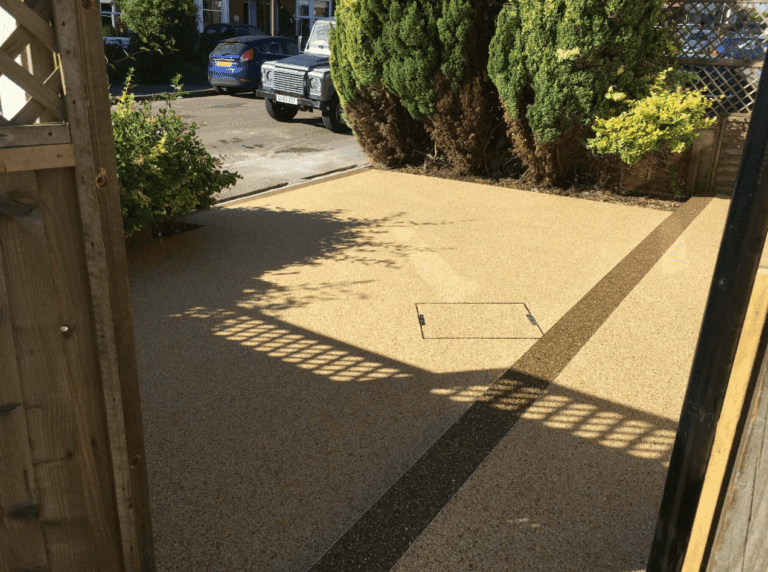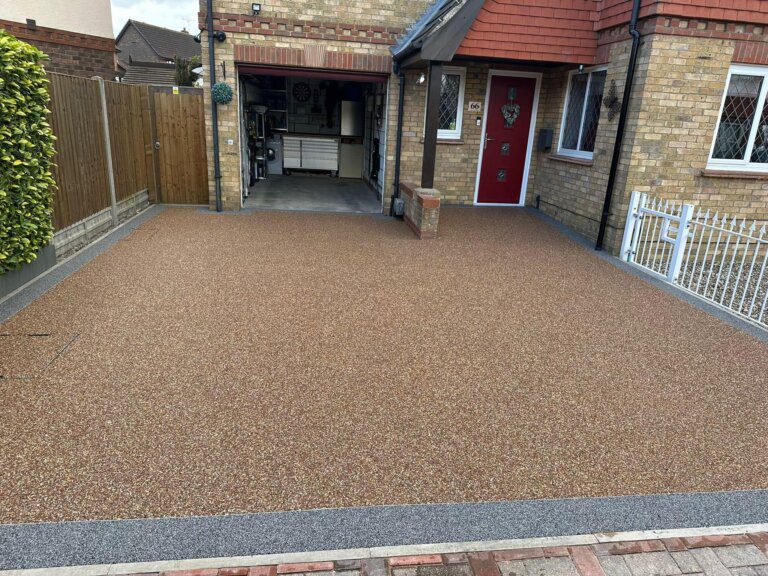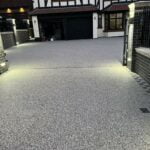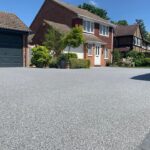Yes, resin-bound driveways are permeable. They allow water to pass through, reducing the risk of flooding. Resin-bound driveways are gaining popularity due to their smooth, attractive finish which appeals to many homeowners. However, aesthetics are not their only advantage. These driveways are also highly practical. A key feature is their permeability, meaning water can drain through them.
This helps prevent puddles and flooding. In this blog, we will explore why permeability matters and how these driveways work. If you are considering a new driveway, you will find this information useful. Let’s delve into why resin-bound driveways might be the ideal choice for you.
Resin-Bound Driveways
Resin-bound driveways are becoming increasingly popular because of their durability and pleasing appearance. But many people wonder: are resin-bound driveways permeable? The answer is yes. They allow water to pass through, preventing puddles and flooding. Let’s examine what resin-bound driveways are and their key features.
What Are They?
Resin-bound driveways are created by mixing resin with aggregates such as gravel, stone, or glass. This mixture is then applied to a prepared surface. The result is a smooth, hard-wearing, and visually appealing surface.
Key points about resin-bound driveways include:
- Permeability: The mixture allows water to drain through the surface, reducing the risk of water pooling.
- Durability: The surface is strong and can withstand heavy use, making it ideal for driveways.
- Low Maintenance: Resin-bound driveways require minimal upkeep. Simple cleaning with a hose or broom keeps them looking their best.
- Variety of Colours: You can choose from a range of colours and textures to complement your home’s aesthetics.
These driveways are also eco-friendly. The materials used are often recycled, and their permeability helps manage rainwater naturally. This makes them an excellent choice for environmentally conscious homeowners.
Key Features
Resin-bound driveways offer several attractive features:
- Permeability: One of their standout qualities. Water drains through the surface, preventing flooding and reducing pressure on drainage systems.
- UV Resistance: The resin used is UV-stable. It will not fade or discolour when exposed to sunlight, keeping your driveway looking new for years.
- Slip Resistance: The textured finish provides excellent grip, reducing the risk of slips and falls.
- Quick Installation: Resin-bound driveways can be installed swiftly. They often cure within 24 hours, so you can use your driveway soon after installation.
Below is a table summarising the key features:
| Feature | Benefit |
| Permeability | Prevents water pooling and flooding |
| UV Resistance | Prevents fading and discolouration |
| Slip Resistance | Reduces the risk of slips and falls |
| Quick Installation | Driveway ready to use within 24 hours |
Resin-bound driveways combine beauty with practicality. They are durable, easy to maintain, and environmentally friendly, making them an excellent choice for modern homeowners.
Permeability Explained
Resin-bound driveways are becoming popular for their aesthetic appeal and durability. But why does their permeability matter? Permeability refers to a material’s ability to allow liquids to pass through it. Let’s explore why this matters and how resin-bound driveways achieve it.
Importance of Permeability
Permeability in driveways is crucial for several reasons:
- Prevents Water Accumulation: A permeable driveway allows rainwater to seep through, reducing puddles and standing water.
- Reduces Flood Risk: When rainwater can pass through the driveway, it eases the burden on drainage systems and lowers the risk of flooding.
- Environmental Benefits: Permeable driveways support groundwater replenishment, vital for maintaining the natural water cycle.
- Regulatory Compliance: In many areas, regulations require new driveways to be permeable to control surface water runoff.
The table below summarises the benefits of permeable driveways:
| Benefit | Description |
| Prevents Water Accumulation | Reduces puddles and standing water |
| Reduces Flood Risk | Lowers the burden on drainage systems |
| Environmental Benefits | Supports groundwater replenishment |
| Regulatory Compliance | Meets local building regulations |
How It Works
Resin-bound driveways achieve permeability through their unique construction:
- Aggregate Selection: These driveways use a blend of natural aggregates like gravel, stone, and recycled materials.
- Resin Binding: The resin coats each aggregate particle, creating gaps between them. These gaps allow water to pass through.
- Installation Process: The mixture is poured onto a prepared base and then trowelled to create a smooth, even surface.
- Curing Time: After installation, the driveway cures, ensuring the resin sets properly and maintains permeability.
The process is illustrated below:
| Step | Description |
| 1. Aggregate Selection | Mix of natural aggregates bound with resin |
| 2. Resin Binding | Creates gaps for water passage |
| 3. Installation Process | Poured and trowelled onto base |
| 4. Curing Time | Ensures proper setting of resin |
This method ensures resin-bound driveways remain both durable and permeable, allowing water to drain away effectively.
Benefits of Permeable Driveways
Resin-bound driveways are not only durable and attractive; their permeability also provides numerous benefits.
Environmental Impact
Permeable driveways protect the environment in various ways:
- Reduced Surface Water Runoff: Less water flows into storm drains, lowering the risk of flooding and erosion.
- Eco-Friendly Driveways: Permeability allows water to seep into the ground, replenishing groundwater.
- Sustainable Paving: Using porous materials supports sustainable urban development by maintaining the natural water cycle.
- Pollution Reduction: As rainwater filters through the ground, pollutants are naturally reduced, leading to cleaner water sources.
The table below highlights environmental benefits:
| Benefit | Impact |
| Reduced Surface Water Runoff | Less flooding and erosion |
| Eco-Friendly Driveways | Replenishes groundwater |
| Pollution Reduction | Cleaner water bodies |
Drainage Solutions
A significant advantage of resin-bound surfacing is its excellent drainage capabilities:
- Water Drainage: Permeable surfaces allow water to drain efficiently, preventing water accumulation.
- Rainwater Management: These driveways manage rainwater effectively, directing it into the ground rather than letting it run off.
- Reduced Maintenance: Effective rainwater management results in less frequent repairs and lower maintenance costs.
The table below outlines how permeable driveways aid drainage solutions:
| Solution | Benefit |
| Water Drainage | Prevents water accumulation |
| Rainwater Management | Efficient water direction |
| Reduced Maintenance | Less frequent repairs |
Resin-Bound vs. Resin-Bonded
Resin-bound and resin-bonded driveways are often confused, but they differ significantly, especially regarding permeability.
Differences in Installation
- Resin-Bound Driveways:
- Resin and aggregates are mixed thoroughly and then trowelled onto the base, creating a smooth, seamless finish.
- A permeable base is required for better water drainage.
- Resin-Bonded Driveways:
- Resin is spread on the base, and aggregates are scattered on top, forming a rough, textured finish.
- Can be installed on existing non-permeable surfaces.
Comparison table:
| Feature | Resin-Bound | Resin-Bonded |
| Installation Process | Mix and trowel | Spread and scatter |
| Surface Finish | Smooth | Textured |
| Base Requirement | Permeable base | Non-permeable acceptable |
Impact on Permeability
- Resin-Bound Driveways:
- Fully permeable surfaces
- Water passes through easily, aiding infiltration
- Reduces surface water issues and flood risk
- Resin-Bonded Driveways:
- Not permeable
- Water does not easily pass through
- May require additional drainage solutions
- Not ideal for areas prone to flooding
If water drainage and durability are your priorities, resin-bound driveways are the superior choice. They function as porous pavements and use permeable paving materials, making them a sustainable option.
Installation Process
Resin-bound driveways are increasingly popular due to their aesthetic appeal and permeability. Proper installation is crucial to ensure durability and functionality.
Preparation Steps
- Survey and Planning: Assess the area for slopes, drainage issues, or obstacles.
- Excavation: Remove the existing surface to a suitable depth (around 200-250mm) and compact the soil.
- Sub-Base Installation: Lay a sub-base layer (MOT type 1 aggregate) and compact thoroughly.
- Edge Restraints: Install edge restraints (concrete, stone, or metal) to define boundaries.
- Membrane Installation: Place a geotextile membrane to prevent weed growth and maintain base layer integrity.
These steps ensure a stable, long-lasting driveway.
Material Selection
Choosing the right materials is essential for performance and appearance:
- Resin: Polyurethane resin is flexible and UV-stable, ideal for outdoor use. Epoxy resin is more rigid and less UV-stable, often used indoors.
- Aggregates: Available in various sizes, shapes, and colours. Natural stone, recycled materials, or coloured glass can be chosen based on aesthetic preference.
- Resin to Aggregate Ratio: Typically 7% resin to 93% aggregate by weight ensures proper binding and permeability.
Material properties:
| Material | Properties |
| Polyurethane Resin | Flexible, UV-stable, suitable outdoors |
| Epoxy Resin | Rigid, not UV-stable, indoor use |
| Natural Stone Aggregates | Durable, various colours and sizes |
| Recycled Glass Aggregates | Eco-friendly, various colours |
Informed material selection ensures a high-quality, visually appealing, and long-lasting resin-bound driveway.
Maintenance Tips
Resin-bound driveways are popular for their permeability and appealing look. They require regular maintenance to remain in top condition, ensuring longevity and functionality.
Cleaning Techniques
- Sweeping: Use a stiff broom regularly to clear leaves, dirt, and debris.
- Washing: Use a garden hose or a low-pressure washer for stubborn dirt.
- Detergent Solution: For oil stains, apply a mild detergent solution and scrub gently.
- Weed Control: Use a weed killer safe for resin surfaces, or remove weeds manually.
Cleaning schedule:
| Task | Frequency |
| Sweeping | Weekly |
| Washing | Monthly |
| Detergent Cleaning | As Needed |
| Weed Control | Quarterly |
Repairing Damage
- Small Cracks: Fill with compatible resin filler, smooth, and allow to dry.
- Potholes: Clear debris, apply a resin and aggregate mix, then level and allow to cure.
- Discolouration: Use UV-resistant resin sealants.
- Edge Damage: Repair with a resin kit and allow it to cure fully.
Regular inspections help identify issues early, preventing minor problems from becoming significant repairs.
Frequently Asked Questions
Are Resin-Bound Driveways Permeable?
Yes, resin-bound driveways are permeable. They allow water to drain through, reducing puddles and flooding.
How Do Resin-Bound Driveways Work?
They use a mix of resin and aggregate stones, creating a porous surface through which water can easily pass.
Do Resin-Bound Driveways Need Maintenance?
Yes, although minimal. Regular cleaning and occasional maintenance ensure they remain both functional and attractive.
Are Resin-Bound Driveways Environmentally Friendly?
Yes, they reduce water runoff, help prevent local flooding, and support groundwater replenishment, making them eco-friendly choices.
Conclusion
Resin-bound driveways provide an excellent, permeable solution. They enable natural water drainage, preventing puddles and reducing flood risks. Additionally, they are durable, low-maintenance, and visually appealing. Opting for a resin-bound driveway benefits both your home and the environment, ensuring an attractive, robust surface for years to come.
If you are considering a new driveway, resin-bound driveways could be the perfect choice for you. Enjoy a beautiful, functional, and sustainable driveway that stands the test of time. Read more: How Long Do Resin Driveways Last? Expert Insights & Tips

